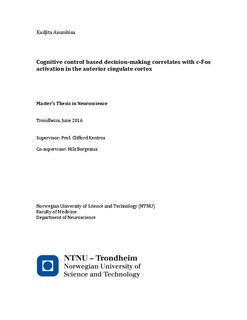| dc.description.abstract | Flexibility in decision-making is usually linked to cognitive control. This is believed to be an essential element required for economically adaptive behaviors in an everchanging environment. With a flexible decision making system, organisms are able to rapidly adjust their actions for optimal outcomes in the face of competing alternatives. Studies show that this kind of flexibility in decision-making is usually impaired in persons with neuropsychiatric conditions such as schizophrenia, depression and substance abuse (Murphy et al., 2001; Rahman, B, R, Rogers, & Robbins, 2001). Cognitive rigidity has often been linked to damage, lesion or inactivation of the anterior cingulate cortex (ACC) (G. B. Bissonette, E. M. Powell, & M. R. Roesch, 2013). This medial frontal cortex structure is believed to hold representations of effort-reward outcomes, needed to drive optimal decisionmaking (Rushworth, Walton, Kennerley, & Bannerman, 2004). Accordingly, rat lesions or inactivation of this region have been shown to result in animals becoming less willing to invest high efforts for large rewards (Hosking, Cocker, & Winstanley, 2014; M. E. Walton, Bannerman, & Rushworth, 2002). However, little is known about ACC’s activation associated with effort-reward based decision making when cognitive control is engaged in an intact brain. By using c-fos immediate early genes, we assessed the association between cognitive control based decision making on the effort T-maze, and its correlates with ACC activation. To test mice on the effort Tmaze, this study first established an appropriate barrier/reward combination (LR arm=8cm[0.2ml] vs SR arm=5cm[0.05ml]) for mice on the effort T-maze; something that was lacking in the literature. In addition, our c-Fos result suggests that activation in ACC correlates with suppression of the less optimal response in the face of competing alternatives. The possible underlying mechanisms and future directions are further discussed. | nb_NO |
